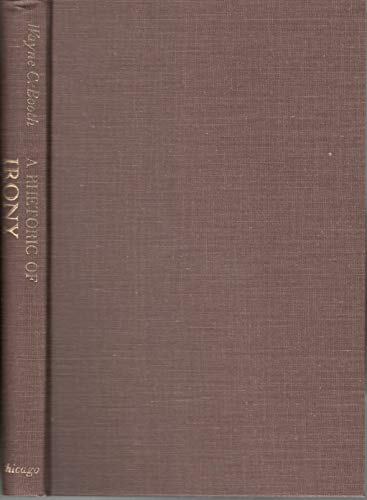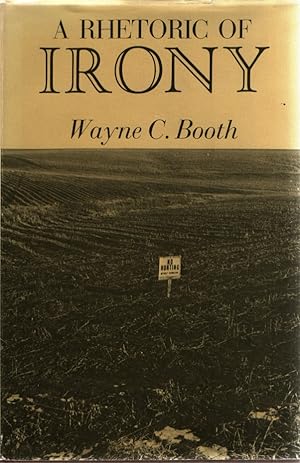0226065529 - Rhetoric of Irony von Booth, Wayne C. (4 Ergebnisse)
Produktart
- Alle Produktarten
- Bücher (4)
- Magazine & Zeitschriften
- Comics
- Noten
- Kunst, Grafik & Poster
- Fotografien
- Karten
-
Manuskripte &
Papierantiquitäten
Zustand
- Alle
- Neu
- Antiquarisch/Gebraucht
Einband
- alle Einbände
- Hardcover
- Softcover
Weitere Eigenschaften
- Erstausgabe
- Signiert
- Schutzumschlag (1)
- Angebotsfoto (1)
Land des Verkäufers
Verkäuferbewertung
-
A Rhetoric of Irony
Verlag: University of Chicago Press, 1975
ISBN 10: 0226065529ISBN 13: 9780226065526
Anbieter: Better World Books, Mishawaka, IN, USA
Buch
Zustand: Very Good. Used book that is in excellent condition. May show signs of wear or have minor defects.
-
A Rhetoric of Irony
Verlag: University of Chicago Press, 1975
ISBN 10: 0226065529ISBN 13: 9780226065526
Anbieter: Better World Books, Mishawaka, IN, USA
Buch
Zustand: Good. Former library book; may include library markings. Used book that is in clean, average condition without any missing pages.
-
A Rhetoric of Irony
Verlag: University of Chicago Press, 1975
ISBN 10: 0226065529ISBN 13: 9780226065526
Anbieter: Robinson Street Books, IOBA, Binghamton, NY, USA
Verbandsmitglied: IOBA
Buch
Hardcover. Zustand: Used: Good. Prompt shipment, with tracking. we ship in CLEAN SECURE BOXES NEW BOXES Literary TheoryGood quality. May have bumped tips, tanning of pages, fraying to the spine, creasing, or small tears to dust jacket.
-
A Rhetoric of Irony.
Verlag: Chicago, London: The University of Chicago Press, 1974
ISBN 10: 0226065529ISBN 13: 9780226065526
Anbieter: Fundus-Online GbR Borkert Schwarz Zerfaß, Berlin, Deutschland
Buch
Hardcover with dust jacket. Zustand: Gut. XIV, 292 p. Aus der Bibliothek von Prof. Wolfgang Haase, langjährigem Herausgeber der ANRW und des International Journal of the Classical Tradition (IJCT) / From the library of Prof. Wolfgang Haase, long-time editor of ANRW and the International Journal of the Classical Tradition (IJCT). - Schutzumschlag mit Randläsuren und kleineren Einrissen, Buchrücken ausgeblichen, Flecken auf Fußschnitt, Vorderschnitt angeschmutzt, handschriftliche Anmerkungen auf Vorsatz, sonst gut und sauber / dust jacket with edgewear and minor tears, spine faded, stains on bottom edge, fore-edge soiled, handwritten annotations on endpapers, otherwise good and clean. - Perhaps no other critical label has been made to cover more ground than "irony." The works of every major author have been called ironic, and some critics have even made irony the touchstone of all good literature. At one time, to call a work or statement ironic conveyed something definite about it. But in our time irony has come to have so many meanings that by itself it means almost nothing. In this work, Wayne C. Booth cuts through the resulting confusions by analyzing how we manage to share quite specific ironies and why we often fail when we try to do so. How does a reader or listener recognize the kind of statement which requires him to reject its "clear" and "obvious" meaning? And how does any reader know where to stop, once he has embarked on the hazardous and exhilarating path of rejecting "what the words say" and reconstructing "what the author means"? In the first and longer part of his work, Booth deals with the workings of what he calls "stable irony," irony with a clear rhetorical intent. Unlike the twists of fate and chance that we conventionally call ironic, stable ironies are "intended, deliberately created by human beings to be heard or read and understood with some precision by other human beings." The author finds that such ironies, when they are grasped and reconstructed, produce a meeting of minds that is astonishingly precise, complex, and intense. Though the ironist risks complete failure, because he courts flat reversals of his meaning, he often earns a kind of success that has never before been fully explored. Treating such implausible knowledge of other minds, Booth is led to conclusions stimulating and helpful to the general reader, yet significant to professional critics, linguists, and philosophers who puzzle over subjects like "meaning," "intentions," "genre," "language games," "communication," and "information theory." After an extended discussion of how we can know "when to stop" in pursuing "the heady delights of ironic communion," the author turns to intended instabilities ironies that resist interpretation and finally lead to the "infinite absolute negativities" that have obsessed criticism since the Romantic period. Booth is always ironically aware that no one can fathom the unfathomable. But by looking closely at unlimited ironists like Samuel Beckett, he shows tha at least some of our commonplaces about meaninglessness require revision. Finally, he explores with the help of Plato the wry paradoxes that threaten any uncompromising assertion that all assertion is undermined by a Supreme Ironist who is dead. / Contents PREFACE Part I. Stable Irony 1 The Ways of Stable Irony The Marks of Stable Irony Stable Irony Compared with "All Literature" The Four Steps of Reconstruction Ironic Reading as Knowledge Meaning and Significance Stable Irony and Other Figures of Speech Metaphor Allegory and Fable Puns Stable Irony and Satire 2 Reconstructions and Judgments Rival Metaphors Advantages of "Reconstruction" Required Judgments Some Pleasures and Pitfalls of Irony 3 Is It Ironic? Clues to Irony 1. Straightforward Warnings in the Author s Own Voice 2. Known Error Proclaimed 3. Conflicts of Facts within the Work 4. Clashes of Style 5. Conflicts of Belief Toward Genre: Clues in Context Part II. Learning Where to Stop 4 Essays, Satire, Parody Contexts and the Grooves of Genre Complexity Illustrated "A Modest Proposal" and the Ironic Sublime Intentions Once Again Intentions in Parody 5 Ironic Portraits Dramatic Monologue Fiction and Drama "Ready-Made" Values Custom-Built Worlds 6 The Ironist s Voice Other Timbres: Metaphor Once Again Fielding E. M. Forster as Essayist 7 Is There a Standard of Taste in Irony? Four Levels of Evaluation A. Judging Parts A ccording to Function B. Qualities as Critical Constants C. Success of Particular Works D. Comparison of Kinds The Rhetorical Meeting as Source of Norms Five Crippling Handicaps Ignorance Inability to Pay Attention Prejudice Lack of Practice Emotional Inadequacy Conclusion: Neither Rules nor Relativism Part III. Instabilities 8 Reconstructing the Unreconstructable: Local Instabilities The Classification of Intended Ironies Stable-Covert-Local Stable-Overt Unstable Irony Unstable-Overt-Local Unstable-Covert-Local 9 Infinite Instabilities Unstable-Overt-Infinite Unstable-Covert-Infinite Stable-Covert-Infinite A Final Note on Evaluation bibliography index. ISBN 9780226065526 Sprache: Englisch Gewicht in Gramm: 536.



